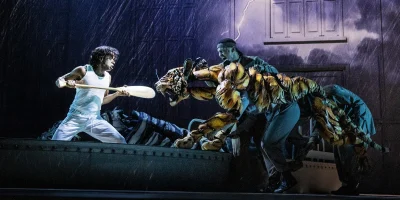
Director Max Webster was 'brave,' 'stupid,' and 'wild' enough to tackle 'Life of Pi' on stage
This interview is part of New York Theatre Guide's Road to the Tonys series on artists whose unique or long journeys with their show culminated in a nomination.
Life of Pi is, simply put, sweeping. The deceptively simple story — a teenager and a tiger share a tiny lifeboat on the ocean, battling for survival after a shipwreck — reveals layers of deception and imagination as it gets peeled back and cross-examined.
Conveying this story on the page, as author Yann Martel did in his original 2001 Life of Pi novel, is one thing. But telling this story on stage requires actors to deliver Lolita Chakrabarti's script clearly, multiple settings to transition smoothly, and puppets representing a variety of animals to feel believably alive and terrifyingly wild. In other words, the two-hour play is a whole different beast.
British director Max Webster was up to tackle it. In fact, he was game before a Life of Pi stage adaptation was officially greenlit and funded.
"I love the book, and I asked various theatres if I could do it, but it turned out a commercial producer had the rights," Webster recalled. "That commercial producer, Simon Friend, went around various theatres and said, 'I want to do Life of Pi.' Luckily, lots of these theatres said, 'Well, there's this director who's brave, stupid, wild enough to have a go at doing this...'"
With Webster in tow, the theatre that accepted Friend's proposal was the Crucible Theatre in Sheffield, England. Life of Pi had its world premiere there in 2019, and its smashing success earned it a transfer to the Wyndham's Theatre in the heart of London's West End. That run earned Webster an Olivier Award nomination for Best Director — and now that Life of Pi has made its cross-ocean journey to Broadway, he's up for the same prize at the 2023 Tony Awards.
The play's intricate, transportive design — which collectively earned multiple Tony nods of its own — is largely what's captured audiences across the globe. But before Life of Pi became a visual spectacle on stage or even on screen in 2012, Martel's thought-provoking words first hooked Webster. His tale weaves in plenty of philosophical food for thought as Pi, the teenager, grasps at hope in any and all belief systems he can find.
"It's a quite personal story to me, in a way, because I'm really interested in the philosophy of it, and the questions, and the relationship to stories and faith," Webster said. "I grew up in the Christian church — that's more complicated to me now, but my journey was very 'Christian teenager, then theatremaker.'"
"Of course, they're not the same thing, but [there's] something about the way in which religion and theatre talk about things that matter most to us, the deepest parts of our humanity, what gets us through the dark night," Webster continued. "It's about a way of trying to make the invisible visible."
That sure sounds like theatre, especially a book-to-stage adaptation like Life of Pi. Webster's production visualizes bestial battles, storm-rocked shipwrecks, and locales from an Indian zoo to a Mexican hospital to the Pacific Ocean. And to think all those once lived only in the imaginations of readers like him.
Get Life of Pi tickets now.
Read more Road to the Tonys interviews with 2023 Tony Award nominees.
Photo credit: Max Webster.(Photo by Kaitlin Randolph)
Originally published on


